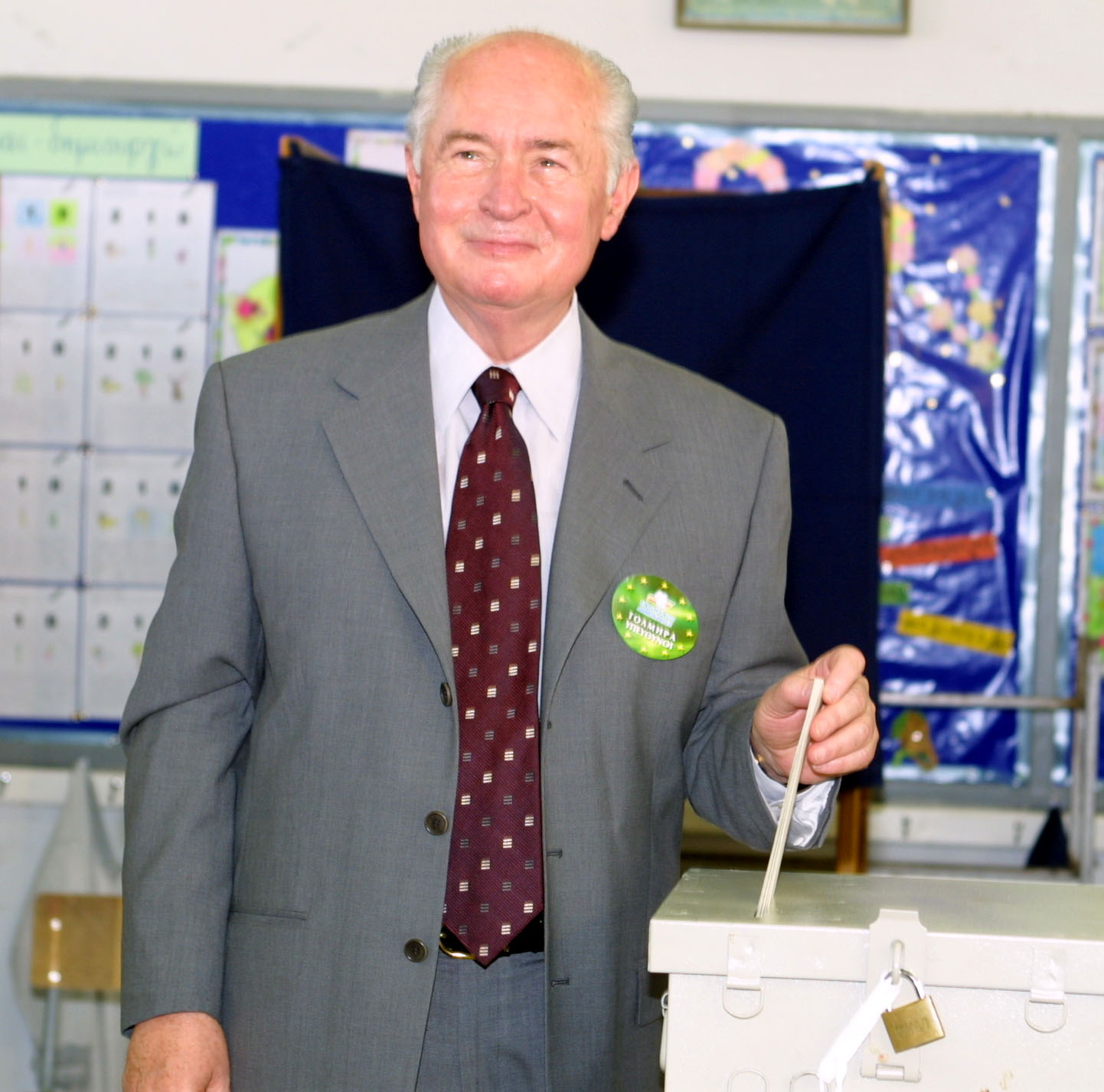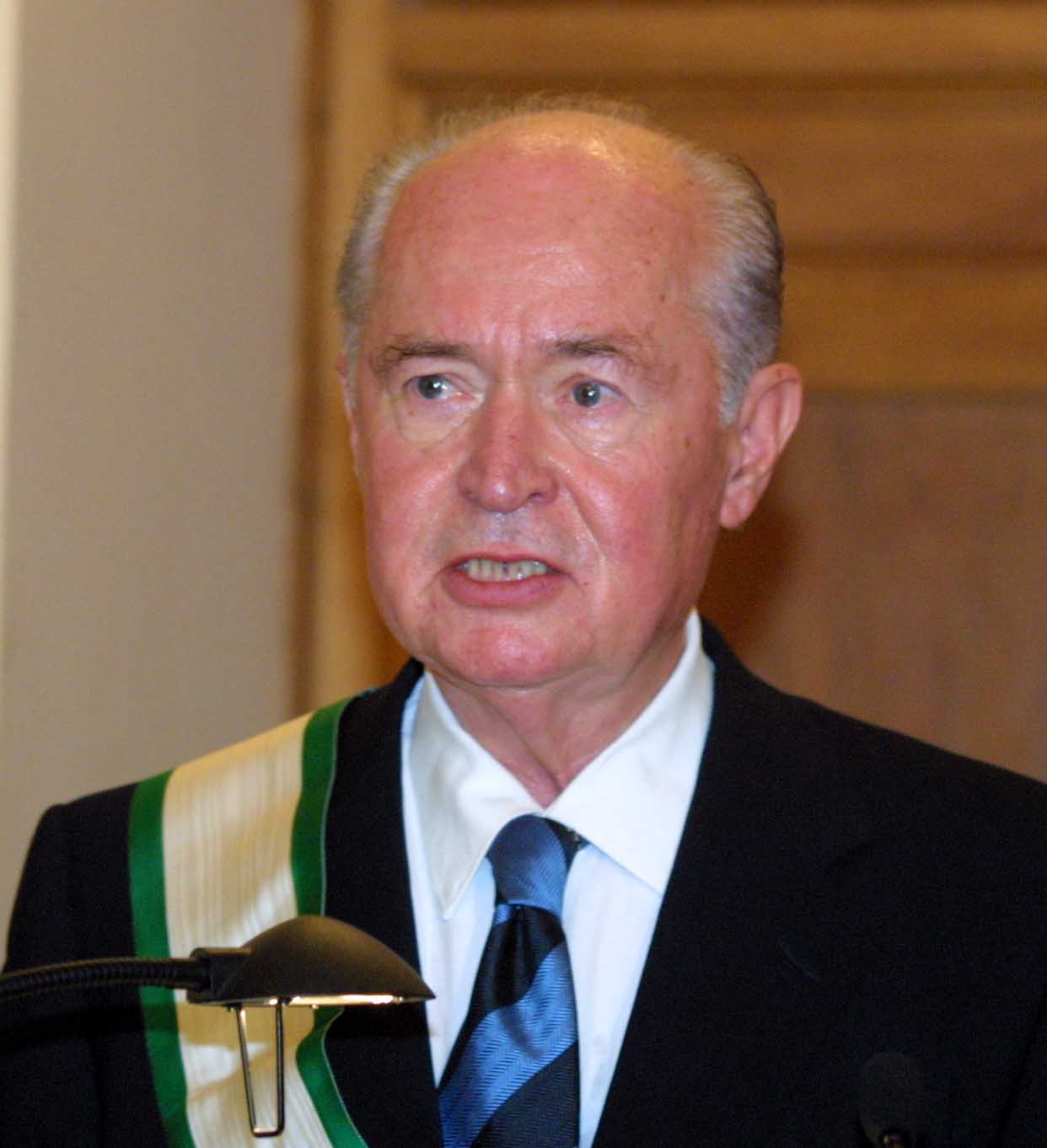Travelling widely during his five years as president, George Vassiliou galvanised international interest in helping to resolve the Cyprus problem. His commitment to a settlement highlighted the obduracy of the veteran Turkish Cypriot leader, Rauf Denktash.
Vassiliou’s goal, however, was a reunited island rather than point-scoring.
Akel, the communist party, chose him as its candidate for the 1988 presidential elections, although he ran as independent, declaring that he would not be a “hostage to any party”.
His first step as president in 1988 was to ditch the “talks with preconditions” policy of the man he ousted, Spyros Kyprianou. Vassiliou’s stance forced Denktash back to the table.
Their talks were given focus during the last year of Vassiliou’s presidency by the “Ghali Set of Ideas” – proposals to reunite Cyprus as a bi-communal, bi-zonal federation that were named after the then UN Secretary-General, Boutros Boutros-Ghali.
When Glafcos Clerides ousted Vassiliou in presidential elections in February 2003, the UN attempted to clinch a deal on a major package of confidence-building measures.
This initiative finally petered out in the spring of 1994, with Boutros-Ghali blaming Denktash for the failure. He said that the UN Security Council “was facing again a familiar scenario: the absence of agreement due essentially to a lack of political will on the Turkish Cypriot side”.
In 1998, Clerides appointed Vassiliou – a firm believer in the European project – as the island’s chief negotiator for accession to the EU. He excelled at the job; Cyprus joined the bloc in May 2004.

This profile by Jean Christou was carried by the Cyprus Mail on December 14, 2014
As we find ourselves in the middle of yet another Cyprus talks hiatus, the past may be no bad thing to delve into, especially for a recuperating president who promised to reflect on the future of the country as he recovers in New York.
At home, former President George Vassiliou – 1988 to 1993 – has just published the English-language version of his book ‘Reflections on the Past and Future’, a 132-page interview with University of Cyprus Turkish Cypriot academic Niazi Kizilyurek.

Vassiliou told the Sunday Mail he wants the book to be a primer of sorts for diplomats or anyone who wants to quickly get the gist of the Cyprus problem over a single weekend. “I felt there was a need,” he said.
I took up the challenge on that promise of a speedy read. Although much of the material Vassiliou covers is well known in terms of history, there are also a number of gems to be found; his roving childhood as the son of committed socialists, the ‘inconvenient’ event that led to his career in business, how he entered politics at the age of 56, and the almost accidental way AKEL chose to back him as a presidential candidate. Vassiliou also exposes some of the failings of his predecessors and successors and recounts how so many opportunities to solve the national issue were lost.
Originally destined to be a doctor like his father, Vassiliou was studying in Geneva during the fifties when the family circumstances changed. There is much more to the tale, but what is important was how subsequent events both shaped his outlook and career.
I saw with my own eyes the tragic consequences of dogmatism
Without finances, his father told him that friends, and the Communist Party, would take care of it, but they let him down and he ended up studying in Budapest. The change helped him learn not to become fixated on the past, he says, something he believes to this day.
Vassiliou said at 19 in Hungary he was an idealistic young man who had been brought up in a family that believed “to the point of self-denial in the idea of socialism”. The years that followed were a period of “slow but gradual realisation of the extremely harsh realities that lay behind the slogans and fine words”.
Working through university as a labourer, Vassiliou took the decision to abandon medicine and study economics. He was expelled from the Hungarian Party in 1959 for trying with others to put a human face on the socialism of the time and decided then to never join another party again.
“I saw with my own eyes the tragic consequences of dogmatism and postponing decision making. Postponement always costs much more and may ultimately lead to what we wish to avoid,” he added, clearly believing the same applies to Cyprus.
Vassiliou came back to Cyprus in 1962 and built up his marketing business here and in the Middle East. His first role in politics came after Spyros Kyprianou’s first term in office in 1983, which was perceived as a failure even though the wily DIKO leader managed to get re-elected.
By 1987 Vassiliou had become convinced Kyprianou had to go because his presidency was a danger to the country with his policy of ‘talks with preconditions’. AKEL had decided to support George Ioannides in the upcoming elections in 1988, but a miffed Kyprianou sent a photo of Ioannides in Masonic robes to the late AKEL leader Ezekias Papaioannou “who nearly had a heart attack”. They chose Vassiliou instead.
Among those for whom he had some harsh words, Vassiliou mentions the Greek leadership during the EOKA struggle for Enosis, which he said they knew was unfeasible. On the one hand they were agreed on the need to reach a compromise with Turkey, and on the other hand they were “selling patriotism to the Cypriots”.
The Cypriot elite in cahoots with the church were also playing this double game, saying one thing to the international community and the opposite to Greek Cypriots. Cyprus failed as a state because “we did not make it happen”, Vassiliou said.
Vassiliou has no doubt that if the coup had not happened, there would have been no invasion, though he was clear that Turkey’s response was disproportionate.
“The post-war shock was so great that we focused on this and forgot everything that had happened before,” he added.
The first thing Vassiliou did as president in 1988 was to ditch Kyprianou’s ‘talks with preconditions’ policy. This stance forced Turkey back to the table in August that year in Geneva and Vassiliou found himself up against Rauf Denktash who was only ever interested in a two-state solution, even though Turkey was pulling the strings.
Eventually, the Ghali Set of Ideas and Confidence Building Measures emerged from the talks, but by that time it was the end of 1992 and Vassiliou’s term was almost up. He believes that if there had been a referendum at that time, 70-75 per cent of Greek Cypriots would have accepted a solution.
Enter DISY’s Glafcos Clerides in 1993, supported by DIKO. “DIKO acted the same way as it does today,” said Vassiliou, referring also to its later support for Demetris Christofias in 2008. “Withdraw your proposals [on the talks]” was the party’s mantra each time it supported a candidate from another party.
“To be frank, I didn’t expect Clerides to remain so true to his word to Kyprianou on disengagement from the Set of Ideas. I had always hoped what he said was for pre-election purposes and that in the end he would continue to follow the course that we had been on together,” Vassiliou said.
He said it took until the end of his first term in 1998 for Clerides to realise his mistake, and he then set in motion a new process that culminated in the Annan plan, which DIKO still managed to scupper.
“Everything happens so that certain people remain in power or if you prefer, because they are seeking an unattainable solution. The singular problem of the Greek Cypriot community is the lack of consistent collaboration between AKEL and DISY who see a solution on the basis of what is feasible,” said Vassiliou.
Eventually, he said, negotiations under Clerides led to the Annan plan but once Tassos Papadopoulos was elected in 2003, “he began a systematic effort” to extricate Cyprus from it. But first he wanted to make sure the EU would still accept the Republic as a divided country by being able to blame the Turkish side for lack of progress.
“He simply hoped, without saying as much, that Denktash would always be there to reject it,” said Vassiliou, which is precisely what happened. The plan then was for the EU to open the door for Cyprus on the assumption that Turkey, which favoured the Annan plan, would remove Denktash from the equation, which it did before Burgenstock in 2004 shortly before the referendum.
Vassiliou said Greece’s Costas Karamanlis then played Pontius Pilate at the Swiss negotiations, giving Papadopoulos a blank cheque to push for rejection of the plan and to blackmail AKEL into saying ‘no’ or they were out of the coalition. “Unfortunately Demetris [Christofias] decided that the party should stay in the government and he made a 180-degree U-turn,” recounts Vassiliou.
Later after Christofias was elected, instead of picking up with the Annan plan, he ditched it, again on DIKO’s insistence, which sounded the death knell for new talks with Mehmet Ali Talat.
Despite all the lost opportunities, Vassiliou appeared optimistic for the new talks but said that without forgiveness and compromise they would not come to anything.
“It is very easy to say no. After all you gain the halo that comes with being a patriot. Such ‘no’ votes take us in the opposite direction. Opting for a ‘yes’ means shouldering one’s responsibilities and many politicians choose either not to shoulder them or to leave them for the next person,” he writes. “There are many who undoubtedly like to give fine speeches and to speak about national vindication because they know that after a solution they will have nothing to say.”
In having to decide whether ‘Reflections on the Past and Future’ can be recommended as meeting its purpose as a ‘weekend primer’, I am going to have to admit that faced with a 24-hour deadline, my intent was to skim through it with a highlighter in hand. Instead I read every word in two and a half hours without my eyes glazing over once. Definitely worth a look, for Cyprob junkies and novices alike.
